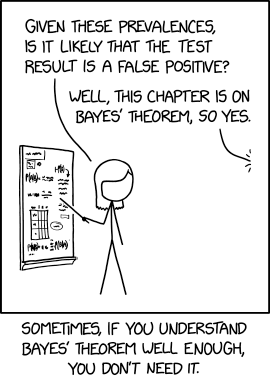2545: Bayes' Theorem
| Bayes' Theorem |
 Title text: P((B |
Explanation
| This is one of 62 incomplete explanations: Created by a BOT - Please change this comment when editing this page. Do NOT delete this tag too soon. If you can fix this issue, edit the page! |
Transcript
| This is one of 43 incomplete transcripts: Do NOT delete this tag too soon. If you can fix this issue, edit the page! |
Discussion
I don't know if the latest (nearly!) global change back to "affected" in the example was intentional or just a cut'n'paste of historical wordings whilst making other tweaks, but I'm not going to go through and change to "infected" a third time (first time, collided with an edit conflict, and so cancelled and worked again on that, albeit with at least one new typo). Yes, in general, being affected or not is correct, but with "affect/effect" confusion (for some) and elsewhere described as "afflicted with" and (still in at least one place) "infected" the example works as well or even better with infections rather than affectations. I was also tempted to change "performant" as not everyone will know exactly what it means, but was stuck for a good substitute ("efficacious" is close, but probably doesn't help a great deal). 172.70.90.211 09:50, 23 November 2021 (UTC)
- I would expect the <1-in-1000 sorts of numbers relevant to the comic to apply to genetic conditions and cancer, not to infections. We don't screen wide swathes of asymptomatic population for infections. Even now with all the testing for COVID-19, the positivity rate is above 1%. -- [[User:{{{1}}}|{{{1}}}]] ([[User talk:{{{1}}}|talk]]) (please sign your comments with ~~~~)
- I'd say "afflicted" throughout would be best, of the suggestions given. Avoid "sufferer/ing" (is benign, or they're a carrier only?) or similar. "Susceptible" might work if you bake that into a minor scenario rewrite.
- But "affected" is vague... Relatives are "affected" if they change their routine to care for an ill person, however negative they'd test.
- (I also instinctively avoid effect/affect because of the 'P((effect|affect)|(effect|affect))' affect/effect... ;) But not a good reason, just nice to hear it's not only me trying to dodge this in everyday writing!) 172.70.162.215 08:02, 24 November 2021 (UTC)
- This is why I proposed ӕffect as a compromise position - but mostly to annoy a friend who studies old english.162.158.91.50 13:00, 25 November 2021 (UTC)
- What was thér response? 172.70.85.227 10:26, 24 November 2021 (UTC)
- They seemed unrædy to hear it 162.158.91.50 13:00, 25 November 2021 (UTC)
- This is why I proposed ӕffect as a compromise position - but mostly to annoy a friend who studies old english.162.158.91.50 13:00, 25 November 2021 (UTC)
- How about "Has condition" and "Doesn't have condition"? It's not too linguistically confusing and aligns with normal parlance -- "I have a cold". The table isn't trying to avoid a multi-word solution, as the headers are two-word phrases. 172.69.68.158 23:46, 10 January 2022 (UTC)
This is the second comic to reference Bayes' Theorem: https://xkcd.com/1236/. Is that worth mentioning in the explanation? I'm a newbie!172.70.34.191 21:32, 23 November 2021 (UTC)
Actually, I forgot this one too: https://xkcd.com/1132/ 172.70.34.191 21:35, 23 November 2021 (UTC)